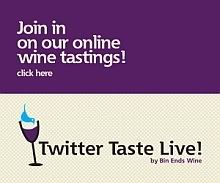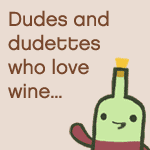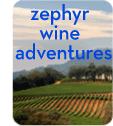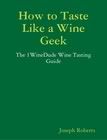 (images: delawaretoday.com, gophila.com, vinology.com, newdaleville.com)
(images: delawaretoday.com, gophila.com, vinology.com, newdaleville.com)
"It is my life's work to identify and bring out colors, smells and flavors that not only typify my region but are also delicious." - Eric Miller, Chaddsford Winery
A few months ago, I started a mini-series of posts about how to become a 'wine geek' (see Part I and Part II for more background). This post is the (long overdue) third installment of that series.
The ultimate wine geek is probably the winemaker - what budding wine geek hasn't (at least for a minute or two) entertained the thought of growing their own grapes, and making and selling their own wine?
I went to the source to get an insight into what it's like to run your own winemaking operation. Following is a short interview with winemaker Eric Miller, proprietor of PA's most celebrated winery, Chaddsford.
I asked Eric to reflect on winemaking after celebrating Chaddsford's 25th year. The result is a fascinating look into what it really takes - passion, know-how, and a fair amount of luck - to make and sell your own wine...
From the point of view of an experienced Winemaker: what resources do you feel give wine lovers the most 'bang for their buck' as beginners just exploring wine, and then as more experienced wine consumers?
 The best resources for a new wine drinker: avoid tight-assed views stuck on old world rules and regs. I teach a twice annual class on what wines taste like, the words to describe them with an international selction under the primary headings of: light fresh fruity dry (white annd red), light fresh fruity sweet (iIonly show a white), med to full body dry white, med to full body red usually a cab, pinot, syrah or shiraz, and a fortified sweet red like lbv porto.
The best resources for a new wine drinker: avoid tight-assed views stuck on old world rules and regs. I teach a twice annual class on what wines taste like, the words to describe them with an international selction under the primary headings of: light fresh fruity dry (white annd red), light fresh fruity sweet (iIonly show a white), med to full body dry white, med to full body red usually a cab, pinot, syrah or shiraz, and a fortified sweet red like lbv porto.My suggestion would be to get the terms down in an environment like that. If that is not available just go to the myriad of shops that do tastings and begin to get vocabulary in tune with taste. If that is not available throw a series of parties and have a hell of a range of wines for friends and you to taste. The important thing is to taste like a banshee.
"There are few printed publications or blogs that are tuned to the beginning wine drinker, unless you want to begin with prejudice or excess info."Or if the new-be is really bold go as close to the source as you can. Winelovers like me will talk eagerly to someone truely interested. (you get a dozen newbes together and iI will speak). There are few printed publications or blogs that are tuned to the beginning wine drinker, unless you want to begin with prejudice or excess info.
What are the most essential resources for you as a Winemaker (excluding your own know-how and expertise)? I.e., the top 3 or 5 resources that you could not live without, and to which you find yourself returning on a regular basis?
What I do to learn is to formulate questions. That is so hard. Then what I do is put it on paper, see how it looks and put together a budget. Then I contact industry friends to see who is working on those topics and send my agenda. When the serious know someone is serious he or she will find time to chat.
To learn about the restaurant industry I read "restaurant wine review". To learn about production I scan "practical winemaker", "the american society of enology and viticulture" and "vineyard and winery management". To understand what it means I make a date with our enologist and she gets excited or answers and shuts me down. Or I call our state viticulturalist, and he either answers me or sends me on down the line. It is never easy.
After 25+ years of successful winemaking, what advice would you give to wine lovers that want to expand their knowledge of wine? What advice would you give to those that may want to someday enter the wine trade?
 I do not have 25 years of succesful winemaking. I have 25 years of trials and some successes. I would say to those who want to learn wine to make the hard decisions about what they want: is it sales or production? One needs to know a bit about either but the disciplines require a life time to get good at. Especially in this varying east coast climate.
I do not have 25 years of succesful winemaking. I have 25 years of trials and some successes. I would say to those who want to learn wine to make the hard decisions about what they want: is it sales or production? One needs to know a bit about either but the disciplines require a life time to get good at. Especially in this varying east coast climate."Climate trumps all but judgment."
Here we are faced with climate change for most vintages and to produce wines typical of the region (and not colored by infections) the first critical thing is to know the effects of site, soil and climate on the development of non-terroir affectations. Climate trumps all but judgment. Being an east coast winemaker today is a commitment to research. I need to be bled dry of information by someone with a depth of technical understanding of the chemistry of our soils, the effects of our climate on what the vine uptakes and how a vineyard should be established so controls are limited. I have limited interest in how to sell. My simple mind says that in today's world of wines we have simple divisions. Superstars that have cult status to carry them, mass marketed products and regional wines with only local interest to carry them.
The future of a successful marketer is to move a lot of wine off the shelf. That's a matter of money and marketing. My future is as a local product with regional identity. It is my life's work to identify and bring out colors, smells and flavors that not only typify my region but are also delicious.
In the course of time I have made wines that a) do not taste like California wines or are from California, Australia, Italy or cost less than 12 bucks a bottle and so are rejected by a significant number of wine drinkers b) suck and I will never be forgiven or tried again c) are exemplary examples of this region and fit the wine-model of only the most broad-minded or uninitiated wine drinker.

"Any good winemaker, if you want my recommendations for someone thinking of getting into the biz, has gotta love delayed gratification. Be bold. And never, never, never, never never, never quit."What that means to those who want to sell wine might be to avoid anything that is new and not-yet-established. Or it might mean that those who see the next big thing will become recognized clairvoyants. How can i make recommendations?
I have been revising my thinking about how best to handle tannins and acidity and fruit character in terms of soil amendments and cultural practices and pressing and timing of malo-lactic fermentations and frankly my attention is gravitating to '08 and '09 releases and analysis of tissue and soils from this growing season in terms of the '08 vintage.
Any good east coast winemaker, if you want my recommendations for someone thinking of getting into the biz, has gotta love delayed gratification. Be bold. Find other winemakers who will talk and keep on trying. And to quote my new friend, Patrick Feury, and Winston Churchill - never, never, never, (Churchill has a tommy gun in this photo) never never, never quit.
How about you ask me the same questions in 10 years?




























2 comments:
I'm not a wine geek, but I have a friend who is, along with her hubby. They would love this blog ;-)
thanks, sam!
Post a Comment